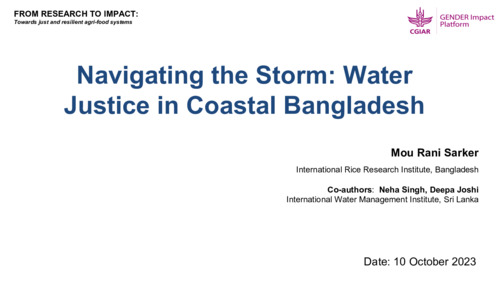Navigating the Storm: Water Justice in Coastal Bangladesh
Abstract
Bangladesh is the 7th most climate vulnerable country, and the impacts of this are largely shaped by water-related challenges in this deltaic country. The gendered dimensions of these challenges are poorly understood and addressed in technical interventions designed to mitigate and enable adaptation to climate impacts. A focus on gender (read women) is often limited to WASH interventions, or at best extends to women’s representation in irrigation water user associations. These interventions fail to address the complexity of interlinked domestic and productive water challenges as well as deep-rooted masculinities in the institutional dynamics of managing water crises. In this presentation, we discuss a water justice framework that combines quantitative and qualitative methods to understand how intersectional gendered inequalities impact water governance and climate resilience. This includes exploring how the structures and cultures of formal and informal institutions shape masculinities in water access, availability and control. In this panel, we will discuss an analytical framework that allows exploring the multiple drivers - socio-cultural, economic, political, and institutional which perpetuate structural gendered-water inequalities from household to policy levels. Addressing transformative water justice as the framework will demonstrate requires paying attention to these complexities, as well as to intersectional disparities that crosscut gendered inequalities.

